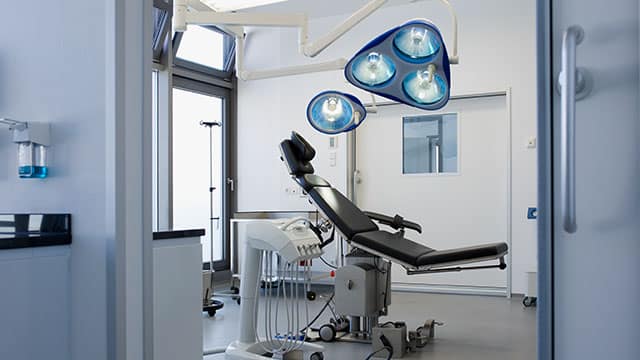What to Expect During Your Dental Prophylaxis Appointment
A prophylaxis dental appointment is a routine, preventive procedure. Your dental hygienist will update your medical history to see if there have been any changes in your health, such as pregnancy, new diagnosis, medications, or other updates. As a preventive measure, they will also do a physical and visual examination of your mouth and neck to screen for oral cancer.
X-Rays
X-rays help your dental professional discover potential oral health problems that aren't visible to the naked eye, like cavities, for example. When your dental professional decides it's time for you to get X-rays, you will probably get bite-wing X-rays of your molar and premolar teeth. Some dental practices also take pictures of the anterior incisor teeth, which are in the front of your bite.
The American Dental Association (ADA) and the Food and Drug Administration created dental radiographic examination guidelines to help dentists with their professional judgment on how best to use this type of imaging. The ADA also recommends that your dentist have a conversation with you about their plan for X-rays so that you can make decisions together.
If you have excellent oral health and regularly see your dental professional, they may recommend X-rays less often than if you're at risk for oral health issues. Factors that dental professionals consider when determining the frequency at which you should get X-rays include the following:
- Age
- Oral health
- Risk for disease
- If you already have signs of oral disease
- Discomfort in your mouth
Periodontal Probing
Once your dental hygienist updates your medical history, they will visually examine your gum tissue and conduct a periodontal probing. This involves measuring the depth of your gum tissue with a tool known as a periodontal probe. It's crucial to measure gum tissue because our gums should fit snug around our teeth. Due to poor oral hygiene, age, or medical conditions, our gums may pull away from our teeth, creating pockets where food particles and bacteria can get stuck.
Besides periodontal probing, your dental hygienist will inspect your teeth. This is to alert your dentist of any areas that should be checked for potential tooth decay. Lastly, they will perform a dental cleaning using special instruments (ultrasonic and hand) to remove plaque and tartar from your teeth and beneath your gumline. Your hygienist will also polish your teeth to remove tooth stains and then clean between your teeth with floss (also known as interdental cleaning).
Ongoing Oral Care Recommendations
Your dental hygienist is an excellent source of knowledge for questions and concerns surrounding at-home oral care. They can make recommendations for taking better care of your mouth and demonstrate proper oral care techniques. They'll remind you to brush your teeth twice per day, floss once per day, and use a mouthwash. Following your dental hygienist's work, your dentist will then perform a full examination of your mouth. This includes examining your teeth, gums, and the rest of your mouth for signs of disease, and reviewing any X-rays that were taken.
Why Dental Prophylaxis is Necessary
If you take good care of your teeth at home, you may be wondering why your dentist says you need this appointment. Many dental problems may go unnoticed in their early stages. They may not cause pain or have visible signs. However, a dental prophylaxis appointment can help your dental professional diagnose these problems at an early stage! For example, it's common not to feel pain from a cavity when it first forms. But your dentist will most likely be able to find that cavity in your prophylaxis appointment and repair it before it gets larger and causes you discomfort.
How Often to Do Dental Prophylaxis
The frequency of attending dental prophylaxis treatments is not a "one size fits all" situation. Some people need to see their dental professionals for a prophylaxis appointment twice a year. However, certain people should follow a different schedule. If your teeth and gums are very healthy, you may not need to go as often. On the other hand, if you have a high risk of dental disease, you may need to up your frequency.
It may be smart for people in high-risk groups to attend a dental prophylaxis appointment every three or four months. These groups include people who smoke, people with gum disease, and people who often get cavities. Pregnant women and people with diabetes or weakened immune systems may also need more appointments than just twice a year.
Have a conversation with your dental professionals about how often you should schedule these visits. They'll want to know of any recent changes to your overall health, not just your teeth, that may affect the frequency at which they see you.
A dental prophylaxis appointment is meant to serve as an essential preventive measure for keeping your mouth healthy and your smile bright. With an oral examination, X-rays, periodontal probing, teeth cleaning, and a relationship with your dental professional in which you feel comfortable discussing your questions and concerns, you are on the ideal track to keeping your mouth as healthy as it can be!
Oral Care Center articles are reviewed by an oral health medical professional. This information is for educational purposes only. This content is not intended to be a substitute for professional medical advice, diagnosis or treatment. Always seek the advice of your dentist, physician or other qualified healthcare provider.
ORAL HEALTH QUIZ
What's behind your smile?
Take our Oral Health assessment to get the most from your oral care routine
ORAL HEALTH QUIZ
What's behind your smile?
Take our Oral Health assessment to get the most from your oral care routine















